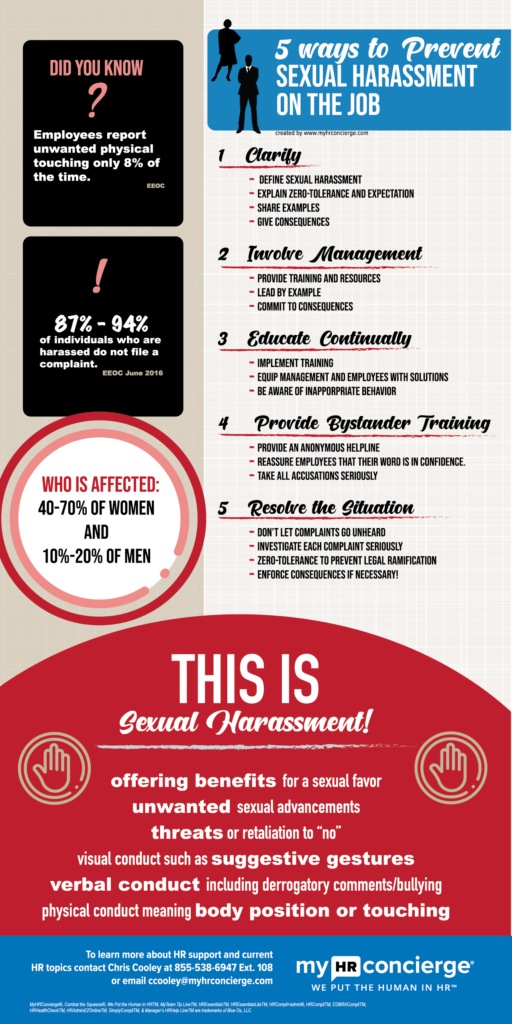Employer Tips For Preventing Sexual Harassment Claims
Last Updated on March 30, 2024 by G. T. HR
Table of contents
- Employers Should Be Prepared To Prevent Sexual Harassment Claims
- Handbooks Should Outline Sexual Harassment Policies Clearly
- Know Who You Are Hiring With a Robust Employee Screening Program
- Tips for Preventing Sexual Harassment Claims in the Workplace
- Make Sure You Have The HR Resources You Need
- MyHRConcierge Can Provide the HR Resources you Need
Employers Should Be Prepared To Prevent Sexual Harassment Claims
In today’s corporate landscape, ensuring a safe and respectful workplace environment is not only an ethical obligation but also a legal necessity. Recent incidents, such as the case involving a McDonald’s franchisee and a teenage employee who suffered sexual assault by a registered sex offender manager, underscore the critical importance for employers to properly address and prevent sexual harassment within their organizations.
The agreement reached between the victim and the McDonald’s franchisee to settle the lawsuit for $4.4 million serves as a stark reminder of the devastating impact of workplace sexual harassment. It highlights the significant financial repercussions that businesses may face when they fail to prioritize the safety and well-being of their employees.
According to the Equal Employment Opportunity Commission (EEOC), employers have a duty to investigate sexual harassment complaints and must take actions to prevent the recurrence of such offensive conduct in their workplace. The actions include having policies and procedures in place to prevent sexual harassment claims.
Handbooks Should Outline Sexual Harassment Policies Clearly
Employee handbooks are a key component in protecting employers and employees from sexual harassment. Employee handbooks are the best way to communicate to employees the company’s policies and what they expect from the employee. One key component of the handbook includes sexual harassment policies that contain the following items:
- Make clear what behaviors, both verbal and physical, constitute sexual harassment. Stress that the company has a strict no-tolerance policy.
- Encourage employees to bring forth claims of harassment so that the company can investigate. Then, take appropriate action and take necessary steps to prevent future harassment.
- Guidelines for how to report sexual harassment.
- A complaint procedure and a response to the complaints procedure for management personnel.
Having these policies not only assist with communicating the policies to the employee, but also helps protect the employer should a rogue employee sexually harass another employee.
Know Who You Are Hiring With a Robust Employee Screening Program
Employee screening is crucial for employers in preventing sexual harassment within the workplace. By thoroughly vetting potential hires, employers can identify any red flags or past incidents of misconduct that may indicate a propensity for inappropriate behavior. This process not only helps in selecting individuals who are more likely to adhere to company policies and standards of conduct but also demonstrates a commitment to creating a safe and respectful work environment for all employees. Additionally, implementing thorough screening procedures through a quality background screening company like MyHRScreens sends a clear message that sexual harassment will not be tolerated, fostering a culture of accountability and respect within the organization. Overall, prioritizing employee screening serves as a proactive measure to mitigate the risk of sexual harassment, protecting both employees and the company’s reputation.
Tips for Preventing Sexual Harassment Claims in the Workplace

Infographic: 5 Ways to Prevent Sexual Harassment on the Job
Here are some other things to consider in preventing sexual harassment in the workplace:
- Provide employees with at least two separate resources for reporting sexual harassment complaints. This protects the employer in case the alleged harasser is the employee’s direct supervisor.
- Designate a female and male staff member from HR to receive sexual harassment claims, preferably individuals with experience in dealing with discrimination and harassment.
- Outline in your policy that employees found guilty of sexual harassment will be subject to disciplinary action, including termination. The disciplinary action should eliminate the harassment and should ensure that the victim feels unthreatened once again. In addition, preventive action should be taken to ensure that a recurrence of the harassment does not occur.
- Discipline for sexual harassment should be as severe as the actions that took place. Punishments should also be consistent for similar actions by different harassers.
- Emphasize that victims will receive no backlash or repercussions if they report sexual harassment. Do not punish the victim for the harassment by removing him or her from their job, department or role within the company.
- Provide an anonymous tip line to employees and encourage the use of the tip line.
- Provide training to employees and make it part of the culture of the workplace. Prevention is key.
Make Sure You Have The HR Resources You Need
Many employers do not have the internal expertise to develop policies and procedures to help prevent sexual harassment claims. Therefore, it is important to have access to experienced HR professionals that can help employers develop policies to help prevent sexual harassment claims, but also assists when claims arise. This is especially important as states are becoming more aggressive in passing laws relating to harassment. If you do not have a internal resource, an outsourced resource such as MyHRConcierge’s HRCompli or HRCompli+Admin services can provide the resources you need.
MyHRConcierge Can Provide the HR Resources you Need
Let MyHRConcierge provide you the HR resources you need to ensure you have an up-to-date employee handbook policies and assistance when employee issues arise. To learn more, contact us at 855-538-6947 ext 108 or ccooley@myhrconcierge.com. Or you can schedule a consultation below.

